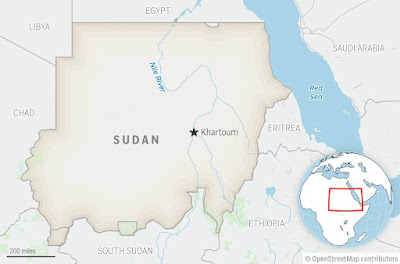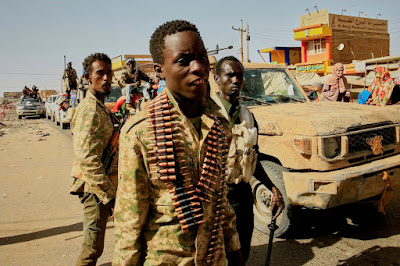By Anne Soy
BBC Senior Africa Correspondent
Published Wednesday, 23 July 2025; 00:04 BST - full copy:
Oil-rich Sudanese region becomes new focus of war between army and rival forces
Attacks that killed hundreds of civilians earlier this month have shifted attention to the battle for this part of the country.
"Whoever controls Kordofan effectively controls the country's oil supply, as well as a huge chunk of Sudan," Amir Amin, an analyst with risk consultancy Oasis Policy Advisory, told the BBC.
The region is also vital for landlocked South Sudan, as its oil flows through pipelines in Kordofan, before being exported. So, it has a vested interest in Kordofan's stability.
However, the battle for the region - which is made up three states, with a population of close to eight million - has intensified since June, when the army focused on regaining the territory from the Rapid Support Forces (RSF) after it made significant gains in the preceding three months, recapturing the capital, Khartoum, and neighbouring Gezira state, the agricultural hub of Sudan.
IMAGE SOURCE, AVAAZ VIA GETTY IMAGES
Image caption Much of the capital, Khartoum - now in the hands of the army - lies in ruins after months of fighting
Sudan's military leader Gen Abdel Fattah al-Burhan flew into Khartoum's main airport on 20 July, his second visit to the city since his troops drove out RSF fighters in March.
Gen Burhan remains based in the eastern city of Port Sudan, suggesting that he is still not confident to return permanently to Khartoum, now a burnt-out wreck.
The conflict has claimed the lives of about 150,000 people and forced about 12 million others from their homes - roughly the equivalent of the population of Tunisia or Belgium.
The RSF had seized Khartoum soon after the war started in April 2023, following a massive fall-out between Gen Burhan and his then-ally, the paramilitary group's commander, Gen Mohamed Hamdan Dagalo, better known as "Hemedti".
The RSF helped Burhan stage a coup in 2021 and crush dissent until they turned on each other after Gen Dagalo resisted his plan to integrate the paramilitary force into the army.
International Crisis Group think-tank analyst Alan Boswell told the BBC that the army now wanted to defeat the RSF in Kordofan so that it could push westwards into Darfur - the paramilitary group's birthplace.
On the other hand, the RSF wanted to seize Kordofan as it would give it "new momentum" and put it "within striking distance of central Sudan, including the capital, again", Mr Boswell said.
Dr Suliman Baldo, the director of Sudan Transparency and Policy Tracker think-tank, told the BBC that he doubted the army could break through RSF defence lines in Kordofan.
He said the majority of RSF fighters were from the large Misseriya ethnic group living in West Kordofan state, which borders Darfur, "and therefore they will be fighting to protect their own communities".
Airstrikes earlier this month by the army in West Kordofan - including its capital, el-Fula, and the town of Abu Zabad - have also antagonised local people, he said, adding that it was a "counterproductive policy of collective punishment of the so-called social incubators" of the RSF.
The army still controls oil fields in the region, but the RSF had threatened to expand the war to oil-producing Heglig in South Kordofan, near the border with South Sudan, if the air bombardment did not stop.
"If the army's aviation returns again and bombs citizens in West Kordofan state, we will strike and shut down Heglig's oil and kill the engineers," Youssef Awadallah Aliyan, the head of the RSF's civilian administration in the state, was quoted as saying by the Sudan Tribune news site after visiting the market hit by airstrikes in el-Fula.
The United Nations Office for the Coordination of Humanitarian Affairs (Ocha) said the strikes on el-Fula and Abu Zabad, including on a school sheltering families, reportedly killed more than 20 people.
Ocha condemned the attacks, saying that civilians and civilian buildings - including schools, homes, and shelters - should "never be targeted", and warring groups should uphold international humanitarian law.
The RSF has also been accused of targeting civilians.
The UN children's agency (Unicef) said more than 450 civilians - including 24 boys, 11 girls and two pregnant women - were reportedly killed in recent attacks in North Kordofan's Bara area and the villages of Shag Alnom and Hilat Hamid.
"These attacks are an outrage," the agency said, adding that "they represent a terrifying escalation of violence" and a "complete disregard for human life".
IMAGE SOURCE, AFP VIA GETTY IMAGES Image caption, Millions have fled their homes in Sudan during the course of the war and many have ended up in camps in neighbouring countries such as the Central African Republic
The US-based Yale Humanitarian Research Lab, which has been monitoring the conflict, said that an analysis of satellite images of Shag Alnom was "indicative of intentional arson attacks".
The Emergency Lawyers rights group said that many of the more than 200 victims "were burned to death in their homes or shot".
Fears are growing that the civilian death toll could worsen following reports that the RSF is mobilising for an offensive to capture el-Obeid, the capital of North Kordofan state.
The town of Umm Sumaima has changed hands several times in recent weeks.
"It is the last defence post for the Sudan Armed Forces before el-Obeid," Dr Baldo said.
Mr Amin said that taking control of Umm Sumaima would allow the RSF to besiege the military, which has a base in el-Obeid, while the army wanted to break through to create a new supply route to rearm its soldiers in other parts of Kordofan.
With the stakes high, the battle for Kordofan - which covers some 390,000 sq km ( 150,000 sq miles) - is expected to be long and protracted.
"Whether or not it will decide the victor of the war is up for debate, but it definitely will be a seismic shift," Mr Amin said.
Further Reading:
Sudan in danger of self-destructing as conflict and famine reign (by Alex de Waal)
'I lost a baby and then rescued a child dodging air strikes in Sudan's civil war'
Last surgeons standing in el-Fasher
A photographer's 11-day trek to flee war-torn Sudan
Sudan's years of war - BBC smuggles in phones to reveal hunger and fear
Sudan war: A simple guide to what is happening
View original: https://www.bbc.co.uk/news/articles/cx209jr79gko
End

.jpeg)

.jpeg)

.jpeg)







.jpeg)
